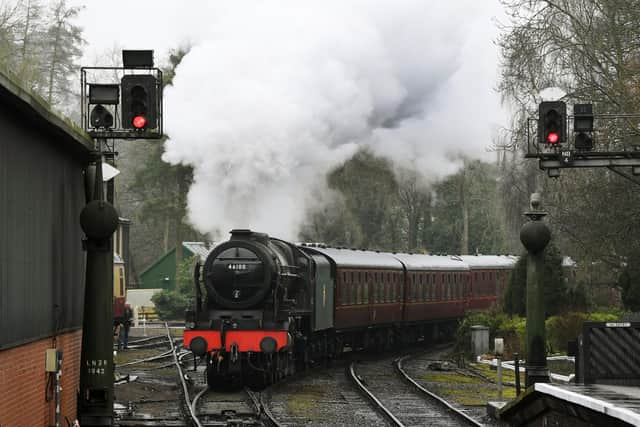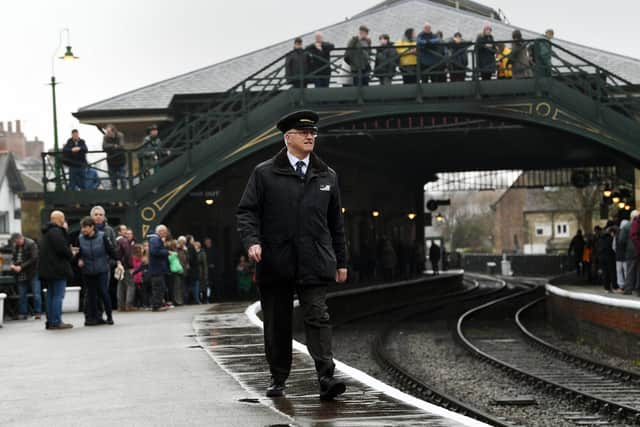Auditors cast 'significant doubt' on North Yorkshire Moors Railway's ability to operate as a going concern after financial losses
The trust that runs the 18-mile heritage line submitted its accounts for the year ending February 2023 to the Charities Commission in December, and the auditors’ report was made available to the public last week.
The document states that the railway made a loss of over half a million pounds due to lower than expected footfall in the summer of 2022 and a huge increase in the price of coal and other materials related to the war in Ukraine.
Advertisement
Hide AdAdvertisement
Hide AdIn comparison to the year’s deficit of £519,000, the previous year the NYMR had a surplus of £2.4million. The net cash outflow was £2.3million, compared to an inflow of £407,000 the previous year.


The year ended with the trust’s bank balance being £1.4million, where it had recorded around £4million in 2022.
The figures are partly explained by the railway’s increased expenditure on coal, which has risen from £67,000 annually to around £308,000. Fuel now has to be sourced from overseas, but is no longer available from Russia.
The report also reveals that two former members of staff received ‘termination payments’ of £15,000 – and in 2022, the total of settlements made to departing employees was £84,000.
Advertisement
Hide AdAdvertisement
Hide AdIt was stated by the accountants that trustee and finance director Garry Mumford’s consultancy firm, Insight Associates Ltd, has received over £6,600 in fees from the railway, and almost £93,000 the previous year.


In a statement signed by vice-chair Andrew Scott, the trustees state that the NYMR is going through a period of ‘rebuilding and change’ post-Covid and is in a ‘period of transition’. The report reads: “Our wider charitable purpose will underpin a sustainable future. (There would be) a deficit under the traditional model.”
They admitted there was ‘some way to go’ to regain pre-Covid visitor footfall, but did include revenue figures for the autumn steam gala (up 42 per cent) and the Pullman dining and Santa Special trains (up 122 per cent since 2019).
Coal price and availability was cited as a ‘future risk’ as well as another pandemic, and as volunteer numbers have declined by around 15 per cent, future volunteers will be expected to be ‘multi-skilled’.
Advertisement
Hide AdAdvertisement
Hide AdA period of ‘tight cash management’ is now necessary until at least August 2024, with the late winter period expected to be the most difficult to negotiate.
However, the auditors included a note of warning about the trustees’ comments, stating: “We wish to draw attention to the assessment of a going concern, noting visitor numbers have not returned to pre-Covid levels and that costs have drastically increased. These events indicate that a material uncertainty exists and that casts significant doubt on the group and the parent charity’s ability to continue as a going concern. Our opinion is not modified.”
The ‘going concern’ section of the report also details of proposals to improve cash flow, such as operating trains later into the autumn, reintroducing the annual season ticket for summer 2024 and running further special events. The NYMR does expect to operate ‘for the forseeable future’ and will have ‘manageable’ shortfalls until the summer.
The NYMR said in a statement: “The current trading climate for all visitor attractions and charities is incredibly tough, and we are facing the same challenges as the rest of the heritage railway industry, visitor attractions and charities in general. This is due to a combination of factors, including the huge rise in the cost of utilities like electricity, and the rising price of coal.
Advertisement
Hide AdAdvertisement
Hide Ad“We operate a heritage fleet and line that requires significant ongoing maintenance and repair to ensure it can survive to be enjoyed by future generations; the cost of living crisis also impacts upon all charity fundraising which is so important to us, with people having less disposable income to dedicate to causes they believe in. However, we are incredibly fortunate to have a strong supporter base who are passionate about our long-term survival.
“We have a phased approach to ensure the railway is financially sustainable moving forward, which includes a variety of initiatives, including departmental restructures; increasing our commercial and fundraising income streams; a review of our assets; and a long-term capital/maintenance programme, which will enable us to package projects and seek external funding.”
